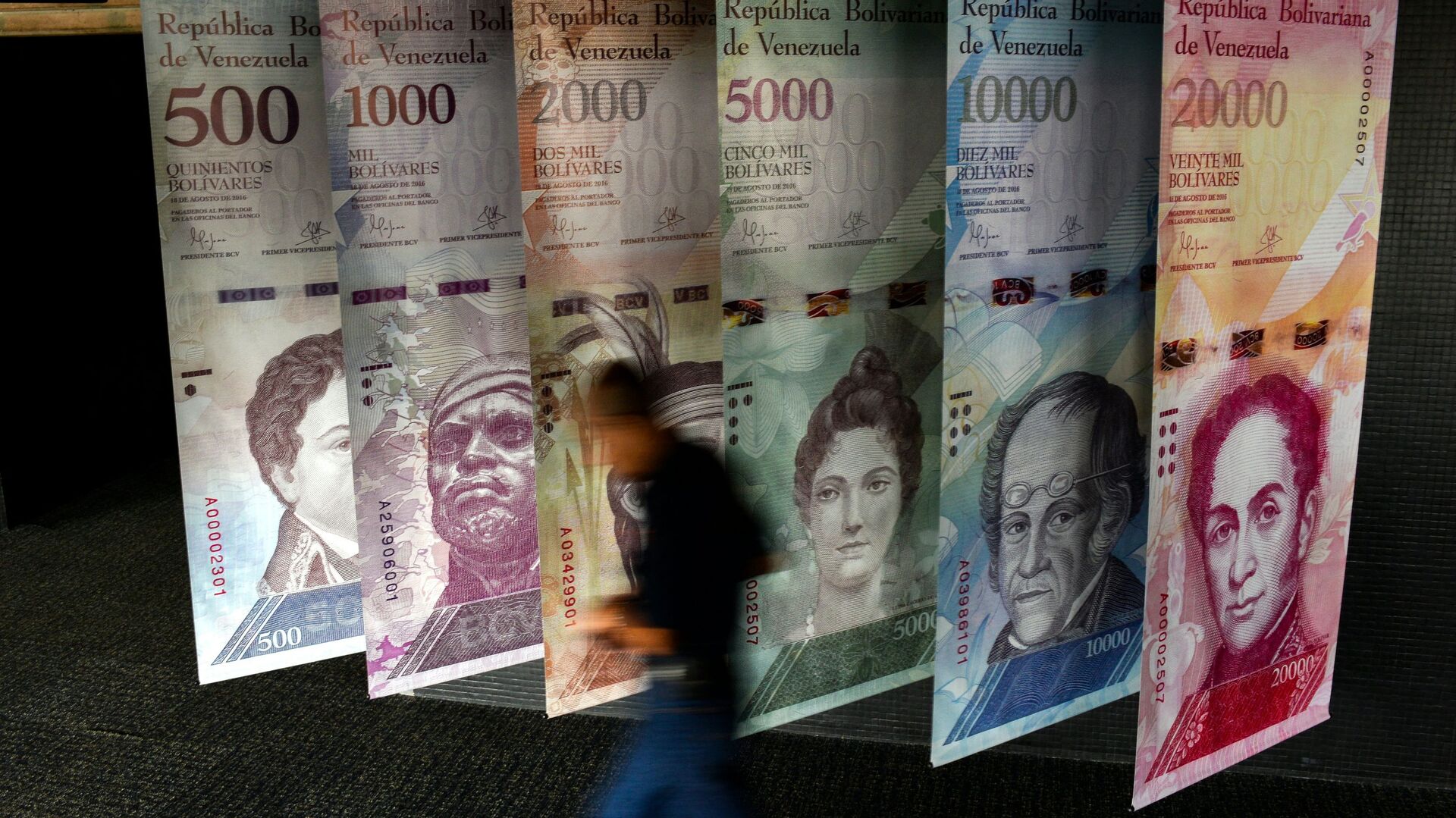https://sputnikglobe.com/20220803/caracas-gets-creative-in-bolstering-economy-as-officials-look-to-offer-shares-of-banco-de-venezuela-1098056108.html
Caracas Gets Creative in Bolstering Economy as Officials Look to Offer Shares of Banco de Venezuela
Caracas Gets Creative in Bolstering Economy as Officials Look to Offer Shares of Banco de Venezuela
Sputnik International
The public offering of stakes in Banco de Venezuela (BDV) and state-run communications service CANTV come as Caracas looks to turn a corner in its yearslong... 03.08.2022, Sputnik International
2022-08-03T02:13+0000
2022-08-03T02:13+0000
2022-08-03T02:13+0000
venezuela
public offering
caracas
nicolás maduro
https://cdn1.img.sputnikglobe.com/img/07e5/08/05/1083535999_0:159:3076:1889_1920x0_80_0_0_73179eff1e2e508467078348cd4510ee.jpg
The government of Venezuela is set to offer stakes in the state-owned Banco de Venezuela and telecom service provider CANTV in the coming weeks, it’s being reported.Announcing the Banco de Venezuela public offering at a news conference in June, Vice President Delcy Rodriguez said the move would “give impetus to the national stock market” and “open the doors” of the enterprises “to national and international investors in local currency or foreign currency.”The public offering is the latest in a series of moves by authorities in the Caribbean nation to correct the course of their ailing economy. In late July, Venezuelan President Nicolas Maduro signed a law designating a number of Special Economic Zones in the country, with an eye towards ultimately transcending “the oil rentier model.”Venezuela has been plagued for years by shortages, extreme inflation, and other serious issues caused in large part by Washington’s unilateral sanctions regime aimed at crippling the country’s economy.To make matters worse, last week, the British Supreme Court ruled that approximately $2 billion in Venezuelan gold that’s currently being held in the Bank of England belongs to opposition leader Juan Guaido, rather than the elected government. Maduro’s administration has indicated it will appeal the decision, but it seems unlikely that authorities in Caracas will prevail, especially given the UK’s extensive history of plotting against the Venezuelan government.While intermittent power outages continue to interfere with oil exports, there are growing signs that Venezuela may have finally turned the corner financially and could soon stand on its own feet once again. Earlier this year, the United Nations Economic Commission for Latin America and the Caribbean forecast that the economy will grow by 5.0% this year – the highest in all of South America.The normalization of ties with Colombia’s incoming Gustavo Petro administration will also provide ample opportunities for increased income and reduced military expenditures. Business groups on both sides of the Colombia-Venezuela border say its planned reopening – which could come as soon as this week – should provide around $1.2 billion in trade by the end of the year.
venezuela
caracas
Sputnik International
feedback@sputniknews.com
+74956456601
MIA „Rossiya Segodnya“
2022
News
en_EN
Sputnik International
feedback@sputniknews.com
+74956456601
MIA „Rossiya Segodnya“
Sputnik International
feedback@sputniknews.com
+74956456601
MIA „Rossiya Segodnya“
venezuela, public offering, caracas, nicolás maduro
venezuela, public offering, caracas, nicolás maduro
Caracas Gets Creative in Bolstering Economy as Officials Look to Offer Shares of Banco de Venezuela
The public offering of stakes in Banco de Venezuela (BDV) and state-run communications service CANTV come as Caracas looks to turn a corner in its yearslong battle against economic atrophy spurred by external economic aggression.
The government of Venezuela is set to offer stakes in the state-owned Banco de Venezuela and telecom service provider CANTV in the coming weeks, it’s being reported.
Announcing the Banco de Venezuela public offering at a news conference in June, Vice President Delcy Rodriguez
said the move would “give impetus to the national stock market” and “open the doors” of the enterprises “to national and international investors in local currency or foreign currency.”
“I think an important time has come for the Venezuelan Stock Market,” she said, stressing that while Venezuelans are “taking the first step with the Bank of Venezuela… the telecommunications company CANTV is coming soon.”
The public offering is the latest in a series of moves by authorities in the Caribbean nation to correct the course of their ailing economy. In late July, Venezuelan President Nicolas Maduro signed a law designating a number of Special Economic Zones in the country, with an eye towards ultimately transcending “the oil rentier model.”
Venezuela has been plagued for years by shortages, extreme inflation, and other serious issues caused in large part by Washington’s unilateral sanctions regime aimed at crippling the country’s economy.
To make matters worse, last week, the British Supreme Court ruled that approximately $2 billion in Venezuelan gold that’s currently being held in the Bank of England belongs to opposition leader Juan Guaido, rather than the elected government.
Maduro’s administration has indicated it will appeal the decision, but it seems unlikely that authorities in Caracas will prevail, especially given the UK’s extensive history of plotting against the Venezuelan government. While intermittent power outages continue to interfere with oil exports, there are growing signs that Venezuela may have finally turned the corner financially and could soon stand on its own feet once again. Earlier this year, the United Nations Economic Commission for Latin America and the Caribbean forecast that the
economy will grow by 5.0% this year – the highest in all of South America.
The normalization of ties with Colombia’s incoming Gustavo Petro administration will also provide ample opportunities for increased income and reduced military expenditures. Business groups on both sides of the Colombia-Venezuela border say its planned reopening – which could come as soon as this week – should provide around $1.2 billion in trade by the end of the year.

